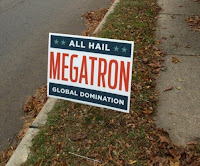Category: Rowling
February 7, 2019 / 1 Comment
In Context
November 3, 2016 / 2 Comments
Democracy In Action!
December 18, 2014
Bulletproof
A simple, straightforward title for this week.
I was talking with my dentist a few weeks back about new television shows (he’s very chill that way) and we brought up… well, I’ll be polite and not mention it by name. He was interested to see where this show went. I’d already predicted a bunch of issues it would need to overcome which it instead chose to embrace fully.
Allow me to explain.
I’m going to create a series from scratch here (although I’m sure some of you will figure out what I’m referring to pretty quick). Let’s say I’m doing a show called Young Revolutionaries. It’s going to be an early-twenties George Washington at university (probably Penn State—that was around then, right?) with early-twenties John Adams and early-twenties Thomas Jefferson and mid-twenties Ben Franklin. There’s also mid-twenties Martha Dandridge who George has an undeclared love for, her sexy designer friend Betsy, and that creepy mid-twenties kid, Benedict, who just lurks around classrooms a lot eavesdropping on people.
 |
| photo: Kat Bardot |
Here’s a few quick episode ideas. What if George gets in trouble during ROTC (that was around then, right?) for chopping down that cherry tree and is told he’ll never be an officer? Maybe he even resigns from the Army. Or maybe Thomas injures his hand in a duel over the honor of foreign exchange student Sally Hemings (that’s more or less correct, right?) and now he may never write anything again. And Ben can have a small breakdown from exam stress and decide he’s giving up on his science/history/philosophy degree and going to be a baker. Or what if Martha decides she’s in love with Benedict and decides to marry him. And when John finds out and tries to stop them from eloping, Benedict shoots him. We could end season one with young John Adams bleeding out in his log cabin.
(Also, I apologize in advance—by putting this out onto the internet there’s a good chance this show just went into development at Fox or the CW. Hopefully I’ll at least gets a “created by” credit when it premieres next fall).
So… what do you think of Young Revolutionaries so far? Sound like a bunch of solid episodes, yes? Lots of dramatic potential?
Even if you’re reading this from somewhere in Europe, you’ve probably already spotted a few holes in my story plans.
 It’s tough to build drama when we already know a lot of details about where the story’s going. I can’t get anxious about whether or not George and Martha get together when I already know they get together. There’s a bit of mild interest how it’s going to happen, sure, but the truth is, because I’m replaying history, this isn’t the first time this has happened. And things lose our interest when they get repeated. That’s just the way of the world. The movie I’m glued to the first time I see it eventually becomes the movie I’ve got on in the background while I’m working on little toy soldiers or something.
It’s tough to build drama when we already know a lot of details about where the story’s going. I can’t get anxious about whether or not George and Martha get together when I already know they get together. There’s a bit of mild interest how it’s going to happen, sure, but the truth is, because I’m replaying history, this isn’t the first time this has happened. And things lose our interest when they get repeated. That’s just the way of the world. The movie I’m glued to the first time I see it eventually becomes the movie I’ve got on in the background while I’m working on little toy soldiers or something.
Likewise, it’s hard to build up drama by using incidents that I know are nullified by later events. George Washington doesn’t just become an officer, he becomes a full general, and me trying to imply this isn’t going to happen is kind of silly. We know Jefferson’s going to write a ton of stuff. John Adams isn’t going to die, either. Heck, he won’t even have any lasting scars or side-effects from that gunshot. The bullet could’ve just bounced off him for all the effect it actually had on things.
And bulletproof characters are boring.
So let’s think about Young Revolutionaries again. George Washington won’t catch a bullet. Ben Franklin definitely won’t. Neither will Martha. Or Thomas. Or Betsy. Even Sally’s pretty safe.
What can I really do with this series? Not much. It’s pretty much just narrative thumb-twiddling as my plot drags along to the points we all know it’s going to hit. That it has to hit, really, because we all know the story.
Y’see, Timmy, if my characters can’t be put at risk, it’s tough to give them any sort of interesting challenge. I can’t have many cool twists to their story if I already know how the story goes and how it ultimately ends. And it’s tough for my readers to relate to a character who’s going against…well, established character. There’s just not much for me to do. It’s very similar to an issue I’ve mentioned a few times before—the characters who are prepared for any and everything.
This is one of the big reasons I’m against prequels. Not as some hard-fast rule, but I think it’s extremely rare that they’re worth the effort (either reading them or writing them). It just tends to be a melodramatic re-hashing of events that ultimately lead… well, right were we knew they were leading all along.
Now, I’d mentioned this “bulletproof” idea to a friend and he made the point that, well, isn’t this true of almost any series character? Marvel isn’t going to kill off Iron Man any time soon, and DC probably doesn’t have a Batman obituary waiting in a drawer. Odds are pretty good Jack Reacher’s not taking a bullet in the head anytime soon. I feel safe saying Kate Beckett won’t be losing an arm in this season’s Castle finale.
We all understand these characters have an aura of safety around them, so to speak. So does this mean alleries characters are bulletproof? Are all these stories destined to be rote melodrama?
 Well, no. Let’s look at something like, say, The Sixth Gun (one of my personal favorites right now). Odds are writer Cullen Bunn isn’t going to kill off Drake Sinclair or Becky Montcrief anytime soon. But it doesn’t mean he won’t and can’t. None of us know what’s happening in issue fifty. Or sixty. Or one hundred. Even if we can be relatively safe in assuming they’re relatively safe… well, there’s still a chance Bunn could pull a Joss Whedon or J.K. Rowling on us and suddenly kill one of his main characters. We can feel pretty safe… but we don’t really know for sure.
Well, no. Let’s look at something like, say, The Sixth Gun (one of my personal favorites right now). Odds are writer Cullen Bunn isn’t going to kill off Drake Sinclair or Becky Montcrief anytime soon. But it doesn’t mean he won’t and can’t. None of us know what’s happening in issue fifty. Or sixty. Or one hundred. Even if we can be relatively safe in assuming they’re relatively safe… well, there’s still a chance Bunn could pull a Joss Whedon or J.K. Rowling on us and suddenly kill one of his main characters. We can feel pretty safe… but we don’t really know for sure.
And there is a world of possibility in that little gap of certainty
But if Bunn decides to flash back to what Sinclair was doing five years ago… well, we all know he didn’t die in a gunfight after a poker game. So hinting that he might is kind of a waste of time. Same thing if he says he’s moving to Asia and never coming back. It’s just more thumb-twiddling until we get back to the real story.
Again, I’m not saying this kind of prequel storytelling can’t work. But it is very, very difficult to do it well. A lot tougher than many Hollywood executives seem to think. And it’s choosing to do an inherently limited idea when I could be doing one where anything could happen. One that’s moving forward, not treading water.
Next time…
Well it had to happen. Next Thursday is Christmas. And the Thursday after that is New Year’s. Some folks believe this only happens every 2342 years, and other folks have looked at a calendar before.
Whichever camp you happen to fall in (I don’t judge…much), I probably won’t be posting on either day. But I’ll probably drop my usual year-end summary here sometime before January.
Until then, go write.







